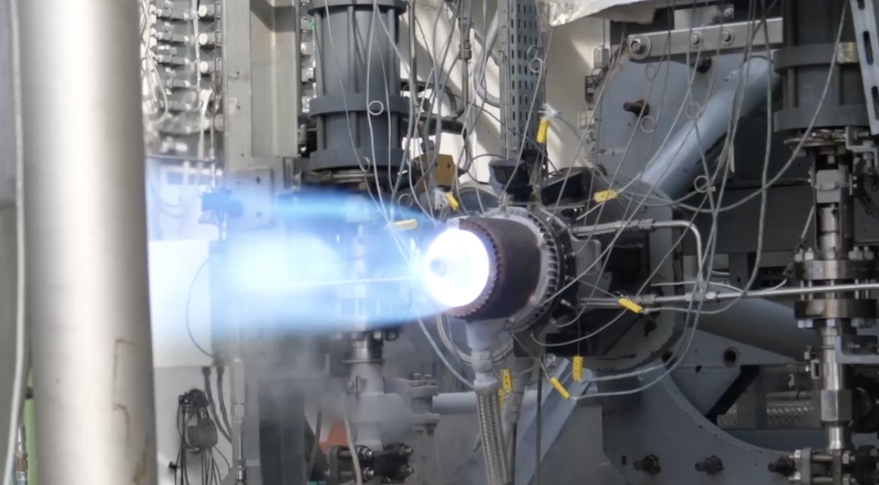WASHINGTON — A European small launch vehicle startup has successfully tested a small version of an aerospike engine powered by methane and liquid oxygen it plans to scale up for use in an orbital vehicle.
Barcelona-based Pangea Aerospace announced Nov. 16 that it completed a series of tests of the aerospike engine, called Demo P1, at a facility in Lampoldshausen, Germany, operated by the German space agency DLR. Those tests, performed over a month, included one test where the 20-kilonewton (4,500-pound-force) engine ran for two and a half minutes.
Aerospike engines have been studied for decades because of their potential greater efficiency. Such engines lack the bell-shaped nozzles of conventional engines, optimizing the expansion of the exhaust. Pangea argues that aerospike engines can be 15% more efficient than conventional ones.
Aerospike engines, though, have been difficult to develop. Pangea thinks it’s solved that problem through the combination of a NASA-developed copper alloy, called GRCop42, as well as 3D-printing of the regeneratively cooled engine, making it easier to produce the complex series of channels for circulating propellants in the engine before reaching the combustion chamber.
“The 3D-printing capabilities in its manufacturing lowers its cost extensively but also enables us to have this freedom of design,” said Adrià Argemí, chief executive of Pangea, in an interview.
This engine was intended to be a demonstration of the aerospike engine technology for use in larger engines. Argemí declined to state the thrust level for their next engine but said it would be powerful enough for a small launch vehicle. The company also has a study contract from the French space agency CNES to study meganewton-class aerospike engines.
He said scaling up the engine should not be as difficult as building and testing the first one. “One thing we are sure now is that, with aerospike propulsion, the bigger you make it, the better it gets,” he said. “For this small one, it was pretty tricky and complex scaling down to cool the surfaces.”
The success of the test will help the company, which has raised more than three million euros ($3.4 million) in private seed funding and about 3.5 million euros in grants and public funding, raise a new funding round. “We are aiming to do our Series A round in 2022 and we already have some interested investors,” said Xavier Llairó, chief commercial officer of Pangea, in the interview.
Pangea hopes to demonstrate the larger version of its aerospike engine in flight in the next three years, Argemí said. “It would be the first flight of an aerospike that we know of, and would prove to everyone that it is a very interesting technology that really helps you maximize your payload into orbit.”
The aerospike engine, Llairó added, will also help with efforts to reuse the vehicle. “Aerospikes are very interesting because they have a regenerative cooling system,” he said. “When you have tail-first reentry, there are a lot of benefits in terms of the shape of the aerospike that’s helping you dissipate the heat loads and have a smoother reentry.”
Those advanced technologies, he said, are critical for the company to stand out in a crowded small launch vehicle market. “We know we are a latecomer in the microlauncher industry, and this is why we’re focusing on the technologies that can really disrupt this market.”
“We’re very proud to say that, today, we probably have the most advanced aerospike engine in the world,” Llairó said. “This is a key element that can radically disrupt the industry in the coming years.”
